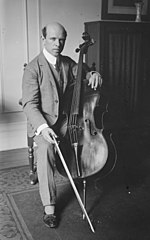
Pablo Casals
Catalan cellist and conductor
History of Political Philosophy scholar (1899-1973)
Leo Strauss was an American scholar of political philosophy who had a long career as a professor at the University of Chicago. He studied the works of Plato, Aristotle, and other influential thinkers, and his research focused on reinterpreting their ideas for contemporary political theory.
Table of Contents
Leo Strausswas an American scholar of political philosophy. Born in Germany to Jewish parents, Strauss later emigrated from Germany to the United States. He spent much of his career as a professor of political science at the University of Chicago, where he taught several generations of students and published fifteen books.
Trained in the neo-Kantian tradition with Ernst Cassirer and immersed in the work of the phenomenologists Edmund Husserl and Martin Heidegger, Strauss authored books on Spinoza and Hobbes, and articles on Maimonides and Al-Farabi. In the late 1930s, his research focused on the texts of Plato and Aristotle, retracing their interpretation through medieval Islamic and Jewish philosophy, and encouraging the application of those ideas to contemporary political theory.
Leo Strauss was born on September 20, 1899.
Leo Strauss was born in Germany to Jewish parents.
Leo Strauss spent much of his career as a professor of political science at the University of Chicago.
Strauss studied the works of Spinoza, Hobbes, Maimonides, Al-Farabi, Plato, and Aristotle.
In the late 1930s, Strauss’ research focused on retracing the interpretation of Plato and Aristotle’s ideas through medieval Islamic and Jewish philosophy, and applying those ideas to contemporary political theory.
Strauss was trained in the neo-Kantian tradition with Ernst Cassirer and was also immersed in the work of the phenomenologists Edmund Husserl and Martin Heidegger.
Leo Strauss passed away on October 18, 1973.
If God is One, and if there can be no other God, there can be no idea of God.
History of Political Philosophy scholar (1899-1973)
God is therefore unknowable. This is the fundamental premise of the Bible.
History of Political Philosophy scholar (1899-1973)
God’s reasons for communicating with man must be subsumed under his reason for communicating to him his account of his creation of the world – and man.
History of Political Philosophy scholar (1899-1973)
But the God of the Bible is not only One, but the only possible One.
History of Political Philosophy scholar (1899-1973)
If the highest things are unknowable, then the highest capacity or virtue of man cannot be theoretical wisdom.
History of Political Philosophy scholar (1899-1973)
All there is to thinking is seeing something noticeable, which makes you see something you weren’t noticing, which makes you see something that isn’t even visible.
History of Political Philosophy scholar (1899-1973)
I cannot know anything of which there is and can be only one.
History of Political Philosophy scholar (1899-1973)